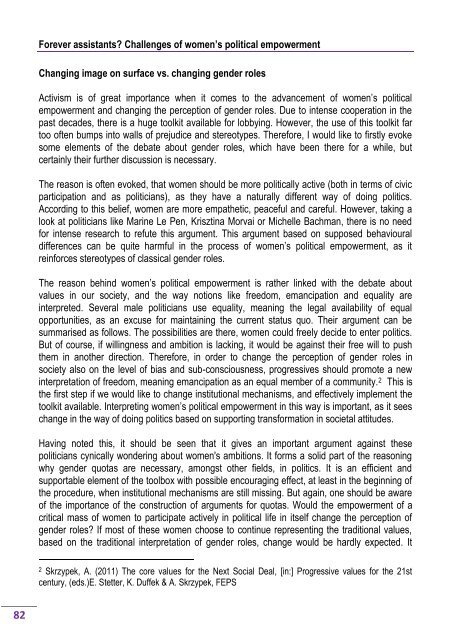Importance of women's political empowerement - Gurmai Zita
Importance of women's political empowerement - Gurmai Zita
Importance of women's political empowerement - Gurmai Zita
You also want an ePaper? Increase the reach of your titles
YUMPU automatically turns print PDFs into web optimized ePapers that Google loves.
82<br />
Forever assistants? Challenges <strong>of</strong> women’s <strong>political</strong> empowerment<br />
Changing image on surface vs. changing gender roles<br />
Activism is <strong>of</strong> great importance when it comes to the advancement <strong>of</strong> women’s <strong>political</strong><br />
empowerment and changing the perception <strong>of</strong> gender roles. Due to intense cooperation in the<br />
past decades, there is a huge toolkit available for lobbying. However, the use <strong>of</strong> this toolkit far<br />
too <strong>of</strong>ten bumps into walls <strong>of</strong> prejudice and stereotypes. Therefore, I would like to firstly evoke<br />
some elements <strong>of</strong> the debate about gender roles, which have been there for a while, but<br />
certainly their further discussion is necessary.<br />
The reason is <strong>of</strong>ten evoked, that women should be more <strong>political</strong>ly active (both in terms <strong>of</strong> civic<br />
participation and as politicians), as they have a naturally different way <strong>of</strong> doing politics.<br />
According to this belief, women are more empathetic, peaceful and careful. However, taking a<br />
look at politicians like Marine Le Pen, Krisztina Morvai or Michelle Bachman, there is no need<br />
for intense research to refute this argument. This argument based on supposed behavioural<br />
differences can be quite harmful in the process <strong>of</strong> women’s <strong>political</strong> empowerment, as it<br />
reinforces stereotypes <strong>of</strong> classical gender roles.<br />
The reason behind women’s <strong>political</strong> empowerment is rather linked with the debate about<br />
values in our society, and the way notions like freedom, emancipation and equality are<br />
interpreted. Several male politicians use equality, meaning the legal availability <strong>of</strong> equal<br />
opportunities, as an excuse for maintaining the current status quo. Their argument can be<br />
summarised as follows. The possibilities are there, women could freely decide to enter politics.<br />
But <strong>of</strong> course, if willingness and ambition is lacking, it would be against their free will to push<br />
them in another direction. Therefore, in order to change the perception <strong>of</strong> gender roles in<br />
society also on the level <strong>of</strong> bias and sub-consciousness, progressives should promote a new<br />
interpretation <strong>of</strong> freedom, meaning emancipation as an equal member <strong>of</strong> a community. 2 This is<br />
the first step if we would like to change institutional mechanisms, and effectively implement the<br />
toolkit available. Interpreting women’s <strong>political</strong> empowerment in this way is important, as it sees<br />
change in the way <strong>of</strong> doing politics based on supporting transformation in societal attitudes.<br />
Having noted this, it should be seen that it gives an important argument against these<br />
politicians cynically wondering about <strong>women's</strong> ambitions. It forms a solid part <strong>of</strong> the reasoning<br />
why gender quotas are necessary, amongst other fields, in politics. It is an efficient and<br />
supportable element <strong>of</strong> the toolbox with possible encouraging effect, at least in the beginning <strong>of</strong><br />
the procedure, when institutional mechanisms are still missing. But again, one should be aware<br />
<strong>of</strong> the importance <strong>of</strong> the construction <strong>of</strong> arguments for quotas. Would the empowerment <strong>of</strong> a<br />
critical mass <strong>of</strong> women to participate actively in <strong>political</strong> life in itself change the perception <strong>of</strong><br />
gender roles? If most <strong>of</strong> these women choose to continue representing the traditional values,<br />
based on the traditional interpretation <strong>of</strong> gender roles, change would be hardly expected. It<br />
2 Skrzypek, A. (2011) The core values for the Next Social Deal, [in:] Progressive values for the 21st<br />
century, (eds.)E. Stetter, K. Duffek & A. Skrzypek, FEPS



